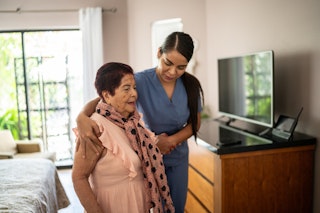Home Care Services for Seniors: Simplifying the Decision-Making Process

Aging at home is often the best option for families; their loved ones can stay in a home they enjoy and that is filled with memories, all in a community they already know. Family and friends are generally already close by, making help and visits more convenient. However, seniors may require some level of care to be able to stay at home, which can be provided by different sources. Home support services for seniors are also cost-effective, reducing the potential financial burden. Here’s a complete guide with everything families need to know about home care services for seniors to help simplify the decision-making process.
What Support Do Elderly People Need?
The types of senior home care services needed may vary a lot from one person to another. Some seniors are still taking care of their gardens well into their 80s, while others with health conditions, might need help with daily living tasks. Here’s a list of some of the most common types of support for seniors, including home health care services.
- Personal Care: Personal care involves basic activities such as getting dressed, moving around the house, bathing, grooming or walking. Some seniors have reduced mobility and need support for this type of tasks.

- Medication Management: The medication plan itself is prescribed by a doctor, but a caregiver can oversee making sure the schedule is followed and there’s no risk of overdoses or missing a dose. In some cases, especially if there’s an injection needed, this type of care must be done by a registered nurse. The caregiver can also monitor for any side effects caused by the medication.
- Nutrition and Meal Support: Eating is a big part of staying healthy, and seniors often have specific dietary needs. Meal support can take many forms. A nutritionist could prepare a weekly menu, and a caregiver could handle preparing the meals in advance and freezing them. It could also involve using services like Meals on Wheels or helping coordinate typical delivery services.
- Domestic Help: As we lose mobility or strength with aging, some domestic help may be required. It could be for some housekeeping, managing the garbage and recycling, doing laundry, making the beds, ironing, etc.
- Mobility and Transport: Mobility covers help with transport, either by driving the person or helping them take public transport or private transport services like a taxi. Evaluating accessibility in the house is also an important factor, especially if the senior uses a wheelchair or a walker.
- Nurse Care: This type of care is given by a registered nurse. It can be done regularly if the person needs health monitoring or treatment like dialysis and wound care. Nurse care can also be hired for a limited period, such as after surgery or for hospital-at-home care.
- Palliative Services: Services to manage pain and other impacts related to serious illness can be offered, whether it is in an end-of-life context or not.
- Money Management: Support for financial and legal matters can also be necessary.
- Companionship: Companionship may seem trivial compared with other types of care, but it can make a huge difference in a senior’s quality of life. Companions can help with certain non-professional tasks, but they also act as emotional support. For example, they can simply spend time with the person, listen to them, or play games and engage in cognitive activities.
Why Is Home Nursing Important?
Home nursing is an essential part of senior care, even though not everyone will need it.
First, this type of care is what makes aging at home possible for seniors who have specific medical needs that can’t be provided by a family caregiver. This means that more people can stay in their homes instead of having to move into a nursing home or having to stay at the hospital for an extended amount of time. The result is simple: more spaces are free in nursing homes and hospitals for people who have no other choices.
For seniors, home nursing means improved health outcomes. Home care nurses understand the care plans of the people they take care of and can monitor their health. If needed, they can adjust the plan, reducing the risk of an emergency.

Receiving care at home also has an impact on the overall health and well-being of the person, as it can reduce feelings of isolation.
Avoiding the need for extended hospital stays or nursing homes, a nurse at home can be quite economical.
Home care nurses are also key for people living with chronic illness and disabilities. They can offer emotional support and companionship. They can also provide valuable education and information resources for families and family caregivers.
By having a nurse come to the home, family caregivers, if any, can take a well-deserved rest. In turn, this greatly reduces the likelihood of burnout.
How To Choose a Caregiver for Senior Care at Home?
The first step on how to choose a caregiver is to assess the senior’s needs, all while considering their preferences. What type of care is needed? How often is it needed? Some answers can come directly from the person or the family, while others will need to be evaluated by a doctor.
Then, you can explore the options based on their needs and preferences. There are three main types of providers: public, private and family.
For the public sector, you’ll contact the CLSC in your municipality. They do offer nursing care at home and other services for seniors. However, there won’t be a lot of flexibility in terms of specific care, and the availability of services can be limited.
With private care, you pay out of pocket, but you can get exactly the types of services that you need, at the level and frequency desired. Also, some financial programs from the government can help cover the costs. Within private care, you can either choose to directly hire someone or go through an agency. If you directly hire someone, there will be more work on your end, while an agency will handle everything. In both cases, some due diligence is necessary.
Family caregivers are also an avenue to consider. If this is what your family is aiming for, don’t forget to still do some research for an external caregiver, as respite care is a must to avoid stress and burnout. It can be a delicate subject of conversation, but it’s also important to be honest about a potential family caregiver’s capacity and true availability.
When choosing a home care provider, you should also consider the values of the provider, the types of services they offer and the proximity of the services. Price is also an important factor, but the quality of care and security of the loved one should always be a priority.

What Is the Process Involved in Hiring an In-Home Caregiver?
Whether looking for agencies for elderly home care or hiring someone on your own, the basic process is similar.
First, a thorough assessment of the senior’s needs is fundamental. Some information might be easy to gather, like the senior’s preferences and wishes, while other details will require a medical opinion.
Then, you’ll have to start looking for a provider. If you go with home health care agencies, look for agencies that have a good reputation with positive reviews. You can ask people you know if they have any recommendations. Take the time to verify their hiring process, to ensure background checks are done on all caregivers. Also, ask for their authorization and certification standards. Generally, a reputable agency will conduct a needs assessment and help you create a care plan that will support your loved ones.
If you wish to hire someone directly, you can use the initial assessment and create a job description, which you can then publish online, in local newspapers, or other means of communication. You’ll have to conduct interviews yourself and conduct some background checks, as well as contact references. Once you have found someone, you’re also in charge of creating a work contract and all the other administrative tasks.
The cost for home care through an agency is usually higher than if you hire someone directly. However, an agency does a lot of the work for you and can provide more than one person if your loved one has needs that should be covered by different caregivers. You will also be covered if the caregiver must leave, either for a short period or permanently. Agencies also have insurance, so you are both protected in case of an incident.
What Are Some Good Home Care Services?
The best home care services for seniors are simply the ones that the person needs and fits within their preferences. It will vary immensely from one person to another. Some types of care are medical by nature, such as wound care, medication surveillance, health monitoring, etc. Personal care is more about assisting the person in daily activities like bathing, getting dressed and grooming. Home care can also be more about housekeeping and nutrition. Care can also cover transportation or help with finance and legal matters.

Basically, any care a senior receives at home is considered home care. For example, a senior might enjoy doing some gardening on their own but can struggle with meal planning and need someone specifically for that. Or the person could be very independent, but their health could require weekly monitoring.
The types of services are significant, but so is the way they are provided. Many tasks that can help a senior can be done by virtually anybody. However, when the person takes the time to be present and is highly empathic, it makes a huge difference for the senior receiving the care. When opting for a home help care agency that does thorough background checks and only hires the best, you ensure that your loved one is in good hands.
What Is Home Health Care for the Elderly?
Home health care for seniors encompasses care that is directly medical but also care that includes support for the health of the senior. This type of care is provided by a regulated health care professional, like nurses and therapists. Here are a few examples.
- Home Nursing: Home nursing covers all care provided by a nurse. It can be simple health monitoring, such as taking blood pressure and blood tests if needed. Medication management can also be done by a nurse, as well as wound care.
- Hospitalization at Home: Hospitalization at home also involves a nurse, but at a more complex level. In this case, the person needs daily monitoring by a nurse or doctor. They are considered stable enough to pursue their recovery at home but still need a higher level of care. Usually, a hospital bed will also be required.
- Rehabilitation Services: Rehabilitation services cover both physiotherapy and occupational therapy. Physiotherapy is often used after an injury to regain strength and mobility, but treatment can also be preventive. As strength and mobility help to reduce the risks of falls, they can prevent incidents. Occupational therapy is all about adapting the home and daily activities to make independent living more feasible. For example, a therapist could recommend a special type of toothbrush, easier to manage for someone with arthritis. If the senior uses a wheelchair, some house modifications could be recommended to make mobility easier. For a senior living with Alzheimer’s, it could be about setting up a system for reminders, with alarms and checklists. Speech therapy can also be part of rehabilitation services. This type of therapy can be necessary if the senior is having trouble speaking or understanding, but also swallowing and other functions relative to communication.
- Help With Medical Equipment: More technical help can be needed with medical equipment like wheelchairs and walkers. Some machines, like glucose meters or blood pressure monitors, can be used at home. Hearing aids and respiratory equipment are other common examples of medical equipment needed by some seniors. Support can include repairs or maintaining the equipment, or any other related tasks.
- Nutrition: Helping with meals doesn’t necessarily have to be supervised by a nutritionist, but it is advisable, especially for seniors with specific needs. Nutrition plays a big role in managing many diseases and conditions. If the senior enjoys cooking and can, the support could simply be a complete nutrition plan with menus. It could also be more complete with meal preparations.
- Palliative Care: Palliative care isn’t necessarily reserved for end of life. This type of care is focused on relieving the pain and other symptoms caused by a serious illness and improving the quality of life. It can be used at any time and helps to reduce the stress of both the loved one and their family.
Why Are Home Care Services the Best Option for Elderly Care?
Senior home health care services, as well as non-medical care, are an amazing option for families. As many senior’s support services are available, it’s possible to create a perfectly personalized care plan that will allow your loved one to age at home. There are many reasons why this could be the best option for your family.
- More Comfort
There is, truly, no place like home. For seniors, staying at home, with access to their own bedroom, bathroom, and kitchen, is much more comfortable. If the original house is too big, moving into a smaller house or an apartment, and having home care, will still be more comfortable than a shared living environment.
Small details, such as bedding, decorations and lighting, can all be adjusted according to the person’s desire, without needing any form of approval.
- Access to Personalized Care
Whether using private home care services, public ones, or a combination of the two, the senior can receive tailored care that will reflect their needs and preferences. In a nursing home, they might receive something more generic and less personalized. Home care can be adjusted as the person’s needs evolve.
- A Sense of Independence and Dignity
While staying home, seniors can enjoy more freedom. They can stick to their routine, make their own choices, participate in activities they like, etc. Home care can even help with these activities through companionship.
- More Family Involvement
Generally, when a senior chooses to age at home, their family is involved in the caregiving process. This ensures a more supportive approach when it comes to care, compared to a nursing home, where you might not know all the daily details. The seniors can feel more secure and supported when the family is highly involved.
- Better Health Outcomes
When a loved one has a medical condition or a disease, monitoring is essential. It can help avoid incidents or crises. When receiving nursing care at home, the person is monitored regularly. Any changes, whether medical or not, can be noticed quickly. If needed, medical intervention can happen earlier, avoiding complications.
- Cost-Effectiveness
Contrary to what some people might believe, home care, even when paid out of pocket, can be very affordable. A nursing home can be very expensive, especially if you are looking for a high level of comfort and independence. With aging at home, the monthly budget remains as it was, and you simply need to add the cost of a nurse or other types of support. These services are usually billed per hour, so you can make a plan that fits the needs of your loved one and their budget. There is also free help available within the public system, as well as tax credits and other financial initiatives.
- Social Impact
Choosing home care also has a broader social impact. It helps free up hospital beds and spots in nursing homes for those who truly need them. Not everyone has the option to remain at home due to health, mobility, or personal circumstances. When someone is able to stay at home, it makes room in care facilities for others who have no alternative, ensuring more equitable access to support.

What Are the Benefits of Choosing a Home Care Agency?
There are many benefits to choosing senior home care instead of having a loved one move into a nursing home. But there are also advantages of working with a home care agency over other options, such as using public services or hiring someone yourself.
- Simplicity
Nothing beats the simplicity of using a home care agency. As they take care of the background checks of their workers, you don’t need to conduct interviews, verify working permits and any other time-consuming administrative tasks. It can provide peace of mind for families looking for the best care possible.
Compared to hiring someone yourself, an agency is likely to be more expensive. However, considering the amount of time needed for the hiring process and the stress it can cause, it is well worth the expense.
- Flexibility
Through the CLSC, a senior can access many types of home care for free. However, depending on their location and the availability of services, they might not be able to get the support they need exactly, or it could be according to a schedule that isn’t ideal. When working with an agency, the client chooses exactly what they want and when they want it.
They could also be able to offer last-minute support. If, for example, there’s a family caregiver and they get sick, an agency could be able to send someone quickly. This, of course, can change from one agency to another.
Also, an agency can easily adjust the care plan to the needs of seniors. If a senior needs more care or less, or if new needs arise, it is easier for an agency to ask for changes.
- Variety
The types of support a senior needs can be very specific and unrelated to each other. For example, a person could need a nurse to visit them once a week, to monitor their health, as well as someone to transport them to medical appointments once a month, and another person to clean the home twice a week. Each of these services will be done by a different person. If you are hiring someone yourself, it means three times the work. Through an agency, this can be all planned at once, and the organization will take care of assigning the tasks to the right person.
Supporting Seniors and Families Through Reliable Home Care
Senior support services at home are a lifesaver for many families, especially for people with medical conditions that would otherwise require moving into a nursing home. Even for seniors without serious health conditions, home care can help them thrive, giving them the best quality of life possible.
Whether you have a dedicated family caregiver or not, working with a reliable home care agency should always be part of the care plan. They can offer specialized medical care, but also offer respite care, and many other services that would benefit any senior and their families.